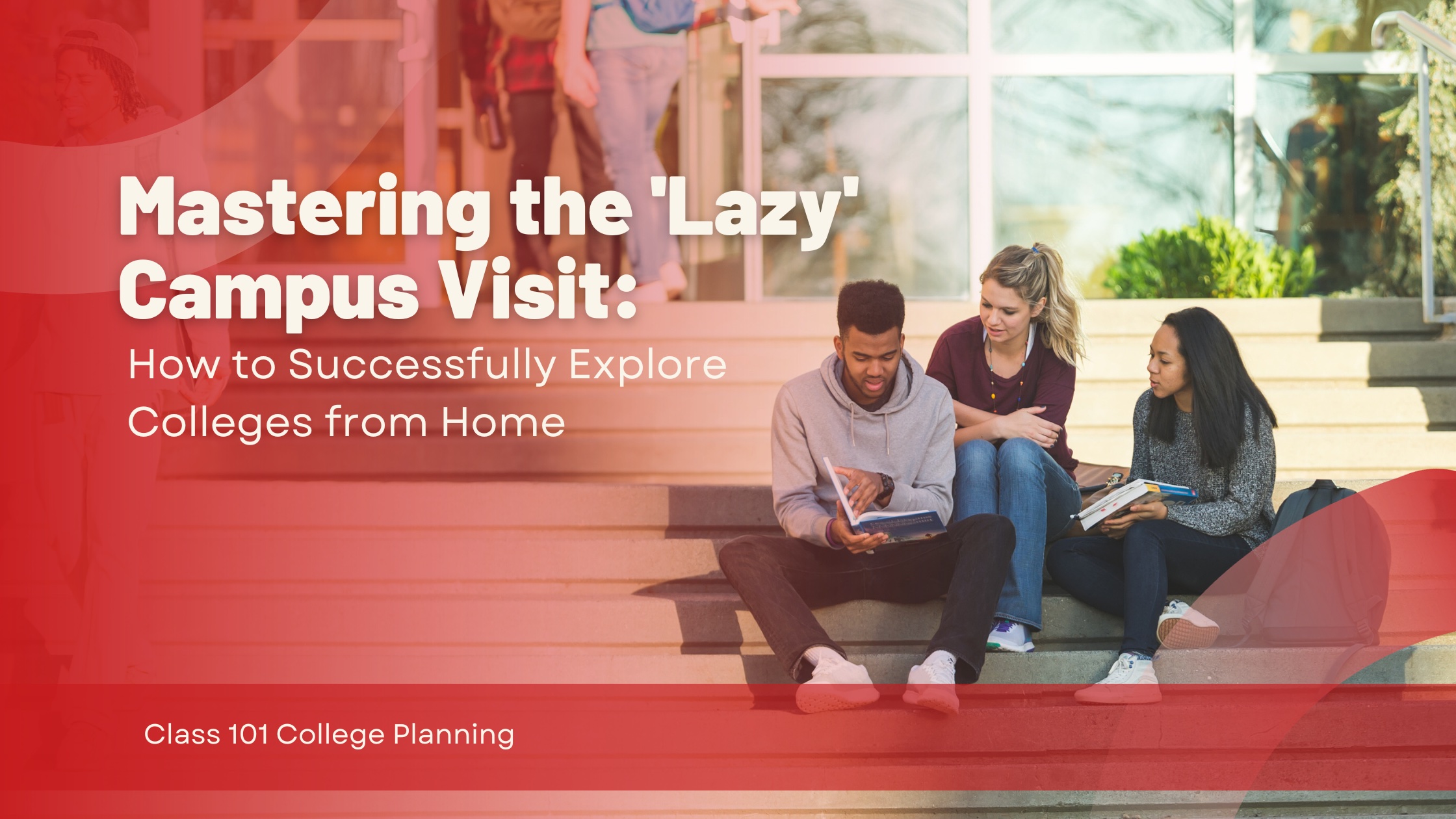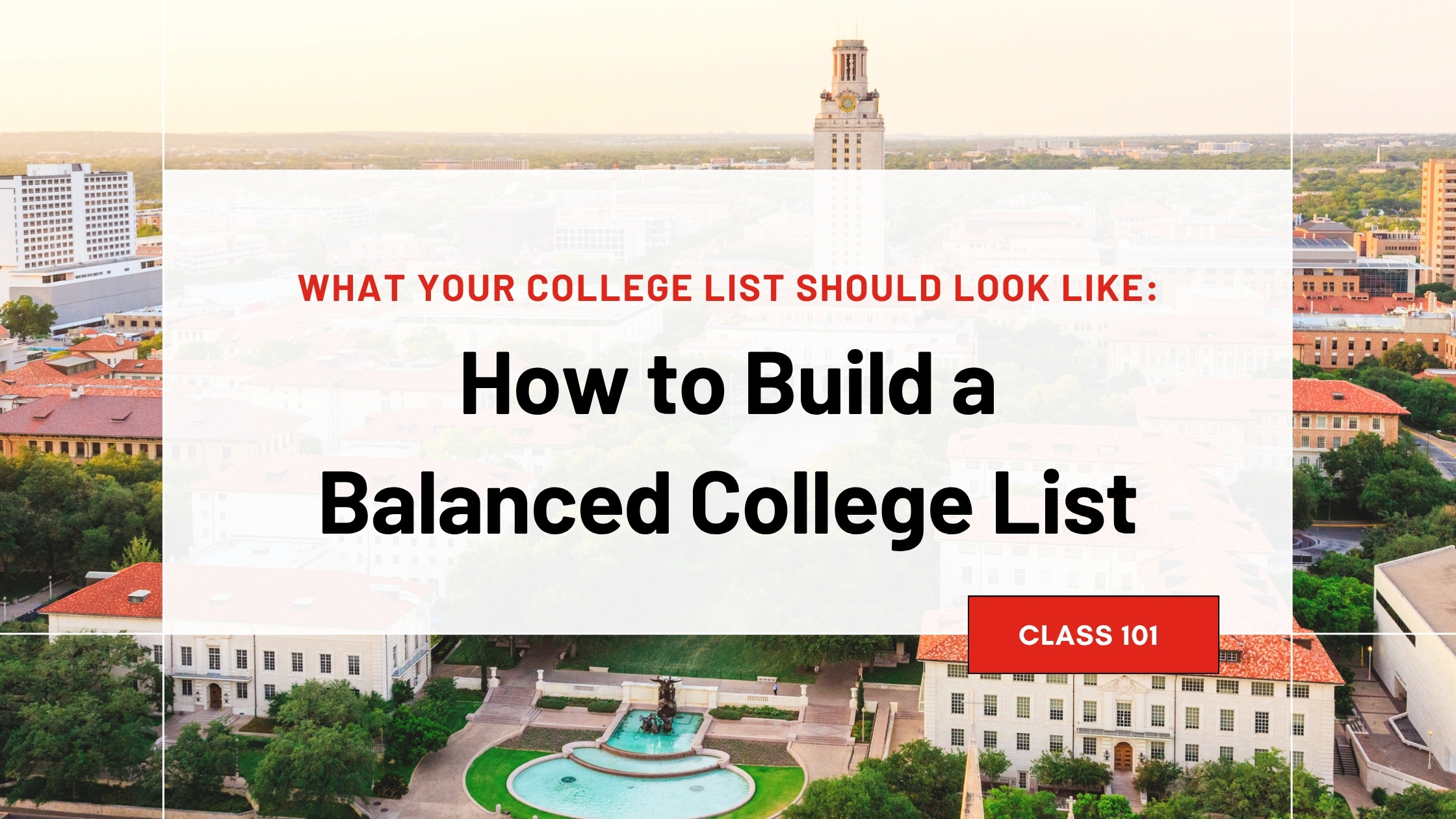January 7, 2024

Look, we get it. It’s the start of the year. It’s hard enough to get out of your pajamas, let alone get out of your house. You know you should start looking at colleges to get ahead of the pack, but all you want to do is sit back, relax, and enjoy whatever leftover sweets are still in the fridge from the holidays.
We’ve all been there. That’s why Class 101 suggests starting the year with a way of looking at colleges that avoids hassle and excitement. Call it the “Lazy College Visit.”
While we always recommend students pursue in-person visits to get a sense of what different universities have to offer, Lazy College Visits give you a way of learning more from the comfort of your bed or couch. A Lazy College Visit can also be an imperfect substitute if you aren’t able to travel or lack the money, or time.
Here’s three quick ways you can take a virtual voyage before trekking across the country.
We know. We know. “Visit the website” is obvious, the kind of advice you might get from your parents who want to make sure you’ve “figured things out.” Still, there’s a kernel of wisdom in the suggestion.
College websites can tell you about a college and the kinds of values it emphasizes. You can learn what students and professors have achieved recently and what the school prides itself on. You can learn about majors and degree programmes as well as the faculty and staff who teach them. There’s often even information on financial rewards and scholarships you might pursue to make college more affordable.
Beyond that, the information displayed gives you hints about how a college wants to be seen and the students it hopes to attract. Kenyon University, for example, has a home page that talks extensively about its “wide-open spaces” and “community,” telling visitors that its a large campus that’s “off the beaten path” but one that strives to build connections between students. The George Washington University, by contrast, puts huge emphasis on “our location” to tell students that it is located in the heart of Washington, DC and has connections with many of the cultural and political centers around the city.
The more sites you look at, the better sense you’ll have of what each school’s appeal is and how it sells itself.
One last tip for the road: If you are interested in some particular part of a college but can’t find it on the school’s website, Google search terms might be helpful in getting the results you need. If you want to find out if Boston College has a program for learning differences, searching “site:https://www.bc.edu/ learning differences” can get you the results you need.
Okay, so visiting the website might give you basic information, but what’s the next step? Is there a step beyond just “reading”? The answer is yes—pivot to video.
Almost every admissions department in the country has admissions videos, either featured on their website or on a dedicated YouTube page (the latter of which you can find by searching a college’s name and “official YouTube” or “official admissions video”). These videos can give you additional information about a college—a look at the campus, recorded webinars from college counselors, and reflections from current students about their chosen major in their own words.
These kinds of videos cannot replace events where you can ask your own personalized questions, but they do allow you to learn more on your own time and at your own pace. Many universities have hours of content, giving you an inside scoop into almost everything you might want to know about.
Just know that just like on TikTok Instagram, colleges and universities are always seeking to cultivate an image. Glossy, well-edited videos can give you a sense of what goes on but it can be an imperfect one.
There’s one last way we recommend to learn about colleges from your own home, a low-cost, low-effort way to get a real person to answer your questions: Attend a Class 101 Virtual College Night.
Throughout the year, our franchises around the country host events with college counselors from places such as Miami University, Auburn University, ASU and much more. During the event, they’ll talk about what their campus is like, the professors and programs they are known for, and the quality of student life. Most events end with a question and answer session where you can raise your own unique concerns.
Make sure to reach out to one of our locations near you to find when they’re holding their next virtual college night. Our advisors are happy to help you register and answer any other questions you might have about the college journey.
***
Finding a college can seem exhausting, but it doesn’t have to be. By starting with the information you find online and through public sources, you can narrow down your search and focus on the universities that offer the programs you need to succeed. We always recommend visiting a college campus to see it for yourself, but these options give you a good place to start.
Once you’ve found a few colleges that are of interest (and recuperated from the winter holiday season), you can go out and visit them in person to confirm that they have all the qualities that you found so compelling when you saw them virtually.
Even if your journey starts from your couch, it’s never too early to get started with college. Talk to a Class 101 location today to figure out your next steps.

June 24, 2025
It’s around this time of year that many students and families start looking for the right college. This process tends to start with a college list, a collection of schools to apply to that match a student’s academic profile, interests, and the kind of experience they want to have. Having a well-rounded, strategic list of […]
Read More >
June 20, 2025
Every year, Class 101 awards scholarships to four high school students through the 101 Scholars program. Given to students of outstanding merit, it asks students to explain how they’ve used their skills and talents to change their community and the lessons they’ve learned from these experiences. This year, Class 101 is pleased to announce the […]
Read More >
May 22, 2025
One of the central parts of the college application process is the application essays. While grades and test scores give some hint at a student’s capabilities, the essay provides an opportunity for a student to present themselves on their terms. It can be used to show not only who they are but how they think […]
Read More >